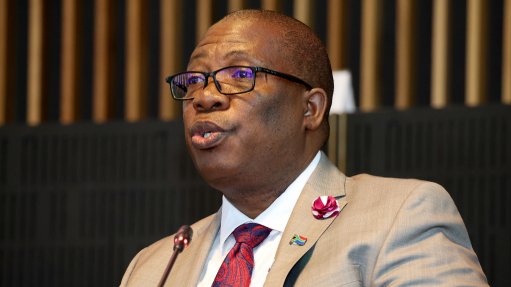Product design, consideration of the local context key to a successful circular economy

This webinar on waste management and the circular economy showcases a panel of experts who unpack the business opportunities for improved waste management and circular economy systems.
The promotion of a circular economy could provide valuable solutions for dealing with South Africa’s growing waste generation and the pressure it is putting on municipal waste facilities, while also potentially creating new business opportunities.
With this in mind, panellists participating in Creamer Media’s ‘Waste management and the circular economy webinar’, on February 26, highlighted the challenges and opportunities of advancing a local circular economy.
Facilitated by African Circular Economy Network circular economy specialist Chris Whyte, topics discussed included seizing business opportunities associated with improved waste management and circular economy systems; and the critical role of science, technology and innovation (STI) for the country's transition to a more circular economy that supports socioeconomic development.
Panellists included National Cleaner Production Centre of South Africa strategy and innovation manager Lee-Hendor Ruiters, Tetra Pak Southern Africa sustainability manager Masale Manoko, Petco former CEO Cheri Scholtz and Council for Scientific and Industrial Research (CSIR) principal scientist and research group leader for sustainability, economics and waste Anton Nahman.
Nahman highlighted the role of STI in ensuring a transition to a circular economy that is just and equitable in the South African context.
He argued that a circular economy should be driven by evidence and supported through innovation.
Nahman noted that the types of STI needed included identifying opportunities for circular economy interventions across a number of key sectors, developing new and innovative technologies as well as new types of business models, materials, processes and other types of interventions to enable circularity, and in particular, innovative solutions that were relevant in a developing country context.
“We need to look at ways in which we can develop solutions that are tailored to our context and that will allow us to leapfrog, in a way, the development pathways of the global north, which are obviously based on a very highly linear economic model.”
Nahman noted the importance of understanding the benefits of a circular economy transition in a developing country context and understanding how best to implement the transition in a South African context in a way that maximised the social, economic and environmental benefits and minimised potential negative impacts.
“For example, we need to understand the types of processes and institutional structures that may best enable the realisation of a circular economy also, obviously, assess specific new types of technologies or products and other interventions from an environmental, social and economic perspective.
“We really need to understand which types of technologies or processes would be most impactful to ensure they actually will have a positive social, economic and environmental impact and to avoid green washing.”
Nahman also argued that the circular economy extended beyond the waste sector and involved rethinking and redesigning the entire economic system and moving away from a material- and energy-intensive linear economy that had contributed to waste and also resource scarcity, biodiversity loss, pollution and climate change.
He said the circular economy provided significant opportunities for achieving commitments related to climate change and sustainable development.
“It really allows us to reduce our reliance on the extraction of primary resources, thereby avoiding resource scarcity and depletion and also reducing energy consumption and greenhouse-gas emissions.”
Nahman also warned that South Africa’s heavy reliance on the export of raw materials and the import of beneficiated products put the resilience of the economy at risk.
As other countries transition towards circularity themselves, and in the current political and economic climate where there's possibilities of reduced trade with some historic key trade partners, Nahman warned that their demand for South Africa’s resources may decline.
“It is, therefore, really important that we start rethinking the way that we use our resources in order to safeguard our future economic development, and we also need to look at transitioning our economy so that it’s not only reliant on extracting and exporting raw materials and importing finished products, but that we're really localising production processes further along the value chain . . . and this is really key for our economic growth and job creation.”
Meanwhile, Ruiters discussed the importance of promoting recycling, engaging communities and developing infrastructure to support entrepreneurial opportunities.
He also noted the role of material recovery facilities in adding value to waste streams and creating business opportunities for entrepreneurs.
Additionally, he discussed the importance of designing products for recyclability and the need for circular business models to extend the lifecycle of products.
He also noted the importance of understanding the needs of specific value chains when designing and adopting circular principles within a business model.
Ruiters argued that designing products in a circular and efficient way could help companies reduce their waste output, use materials more efficiently and allow products to easily enter the recycled value chain.
Article Enquiry
Email Article
Save Article
Feedback
To advertise email advertising@creamermedia.co.za or click here
Press Office
Announcements
What's On
Subscribe to improve your user experience...
Option 1 (equivalent of R125 a month):
Receive a weekly copy of Creamer Media's Engineering News & Mining Weekly magazine
(print copy for those in South Africa and e-magazine for those outside of South Africa)
Receive daily email newsletters
Access to full search results
Access archive of magazine back copies
Access to Projects in Progress
Access to ONE Research Report of your choice in PDF format
Option 2 (equivalent of R375 a month):
All benefits from Option 1
PLUS
Access to Creamer Media's Research Channel Africa for ALL Research Reports, in PDF format, on various industrial and mining sectors
including Electricity; Water; Energy Transition; Hydrogen; Roads, Rail and Ports; Coal; Gold; Platinum; Battery Metals; etc.
Already a subscriber?
Forgotten your password?
Receive weekly copy of Creamer Media's Engineering News & Mining Weekly magazine (print copy for those in South Africa and e-magazine for those outside of South Africa)
➕
Recieve daily email newsletters
➕
Access to full search results
➕
Access archive of magazine back copies
➕
Access to Projects in Progress
➕
Access to ONE Research Report of your choice in PDF format
RESEARCH CHANNEL AFRICA
R4500 (equivalent of R375 a month)
SUBSCRIBEAll benefits from Option 1
➕
Access to Creamer Media's Research Channel Africa for ALL Research Reports on various industrial and mining sectors, in PDF format, including on:
Electricity
➕
Water
➕
Energy Transition
➕
Hydrogen
➕
Roads, Rail and Ports
➕
Coal
➕
Gold
➕
Platinum
➕
Battery Metals
➕
etc.
Receive all benefits from Option 1 or Option 2 delivered to numerous people at your company
➕
Multiple User names and Passwords for simultaneous log-ins
➕
Intranet integration access to all in your organisation



















